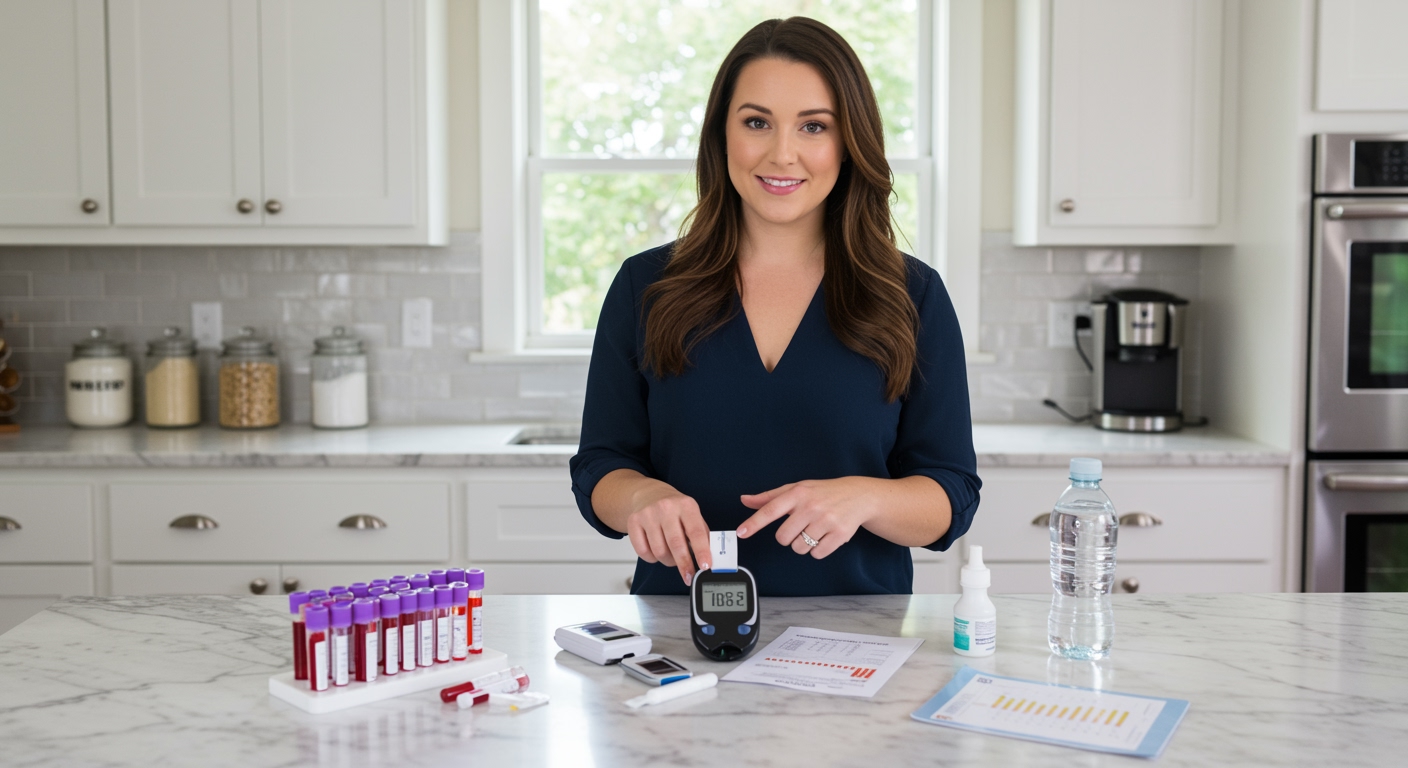✪ Key Takeaway: Most PCOS blood tests don’t require fasting, but glucose and lipid tests need 8-12 hours of fasting for accurate results.
Introduction
You wake up at 6 AM, stomach growling, wondering if you can grab that cup of coffee before your PCOS blood work appointment.
Many women with PCOS feel confused about fasting requirements because different tests have different rules, and doctors don’t always explain which tests need fasting and which ones don’t.
Hi, I’m Abdur, your nutrition coach, and today I’m going to explain exactly which PCOS blood tests require fasting and give you a clear plan for getting accurate results.
Which PCOS Blood Tests Actually Need Fasting?
Only glucose tolerance tests and lipid panels require true fasting for women with PCOS.
The oral glucose tolerance test measures how your body processes sugar after drinking a glucose solution, so any food in your system would interfere with accurate readings.
Lipid panels check your cholesterol and triglyceride levels, which can be elevated for up to 6 hours after eating fatty foods.
Fasting blood glucose tests need 8-12 hours without food to measure your body’s baseline sugar levels accurately.
Most other PCOS tests like hormone panels, thyroid function, and inflammation markers don’t require fasting at all.
✪ Pro Tip: Ask your doctor which specific tests you’re getting so you know exactly what fasting requirements apply to your situation.
What Happens If You Don’t Fast When Required?
Eating before a glucose test can make your blood sugar appear dangerously high when it’s actually normal.
This false reading might lead your doctor to diagnose diabetes or insulin resistance when you don’t actually have these conditions.
Non-fasting lipid tests can show triglyceride levels that are 20-30% higher than your true baseline levels.
These inflated numbers might prompt unnecessary medication prescriptions or overly restrictive dietary recommendations.
Your doctor might also order additional expensive tests to investigate problems that don’t actually exist.
The stress and anxiety from false positive results can worsen PCOS symptoms through increased cortisol production.
✪ Fact: Studies show that non-fasting glucose tests can be up to 40% higher than fasting levels in the same person.
Can You Drink Water During PCOS Blood Test Fasting?
Plain water is not only allowed but strongly encouraged during fasting periods before blood tests.
Staying hydrated makes your veins more visible and accessible, which helps the lab technician draw blood more easily.
Dehydration can make your blood more concentrated, potentially affecting certain test results like kidney function markers.
Water doesn’t contain calories, sugar, or fat, so it won’t interfere with glucose or lipid measurements.
However, avoid flavored waters, sparkling water with artificial sweeteners, or any beverages with added ingredients.
Coffee, tea, diet sodas, and even sugar-free gum can trigger digestive responses that might affect your test results.
✪ Note: Drink 16-20 ounces of water 2 hours before your blood draw to ensure optimal hydration without feeling uncomfortable.
How Long Should Women With PCOS Fast Before Blood Tests?
The standard fasting period for PCOS-related blood tests is 8-12 hours for most glucose and lipid measurements.
Fasting for less than 8 hours might not give your body enough time to clear food-related glucose and fats from your bloodstream.
Fasting longer than 14 hours can actually cause your liver to release stored glucose, making your fasting blood sugar appear artificially elevated.
The oral glucose tolerance test specifically requires exactly 8-14 hours of fasting for standardized results.
Schedule your blood draw for early morning appointments to make fasting easier and avoid disrupting your entire day.
Women with PCOS who take metformin should continue their medication unless specifically instructed otherwise by their doctor.
✪ Pro Tip: Eat a balanced dinner the night before and schedule your blood draw between 7-9 AM for optimal fasting compliance.
What About Hormone Tests For PCOS?
Testosterone, LH, FSH, and other hormone tests for PCOS diagnosis don’t require fasting at all.
These hormones fluctuate naturally throughout the day based on your circadian rhythm, not your food intake.
However, the timing of your cycle matters more than fasting for accurate hormone measurements in women with PCOS.
Your doctor might request hormone tests on specific days of your cycle or after a certain number of days without a period.
Insulin levels can be measured both fasting and non-fasting, depending on what your doctor wants to evaluate.
Thyroid function tests also don’t require fasting, though they’re often done alongside other PCOS blood work.
✪ Fact: Hormone levels in women with PCOS are often measured regardless of cycle day due to irregular or absent periods.
The Bottom Line
Most PCOS blood tests don’t require fasting, but glucose tolerance tests and lipid panels absolutely do need 8-12 hours without food for accurate results.
Smart preparation prevents poor results, so always confirm fasting requirements with your healthcare provider before your appointment.
I’d love to hear about your experiences with PCOS blood testing or any questions you have about preparing for your next lab work in the comments below.
References
At NutritionCrown, we use quality and credible sources to ensure our content is accurate and trustworthy. Below are the sources referenced in creating this article:
- Nguyen Medical: Do You Really Need to Fast Before a Blood Test
- TMB: Blood Tests PCOS
- Advanced Women’s Health: 5 Lab Tests to Consider if You Have PCOS
- Mayo Clinic: PCOS Diagnosis Treatment





